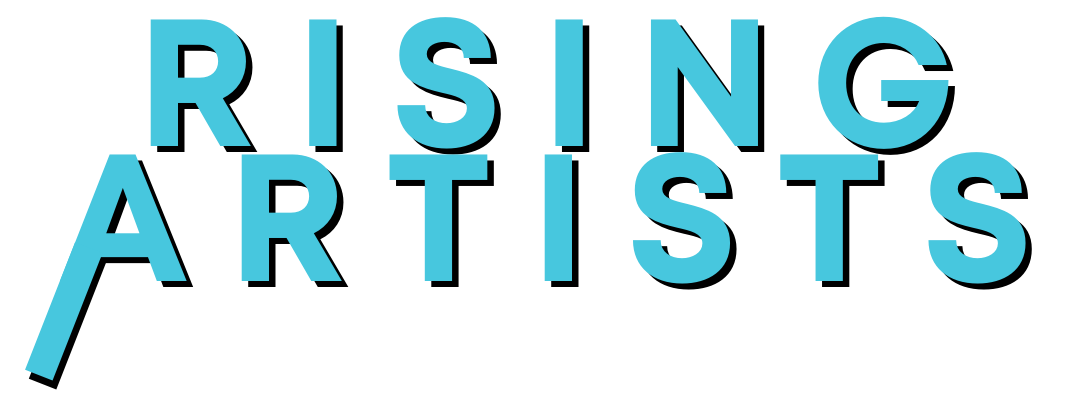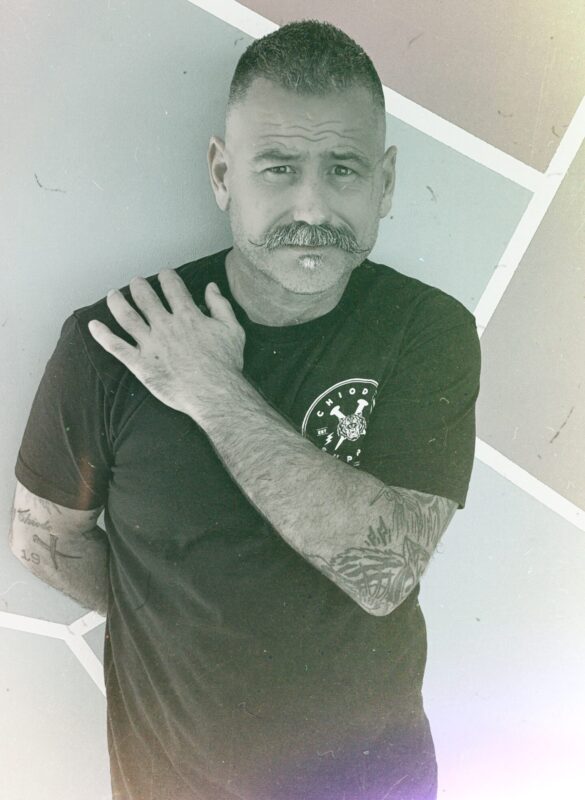Q: I really loved “The Reckoning.” I think it was beautifully produced. I think I read somewhere that you said it’s about small-town justice, but I wanted to know more about that. What’s the song about, and what inspired it?
CHIODOSUPPLY: A lot of it is about what’s going on in the world. I have a punk rock background, and growing up in that environment, justice was always important. For me, the punk rock movement was about pointing out injustice and standing for liberty for people from all walks of life. I still carry that into my songwriting. I hate seeing injustice, and when I do, I call it out. This song is about that — about the lack of people standing up for others who need it. It’s about seeing an injustice and being the one to deal with it for the greater good. We frame it around a small town, but it’s really about the country and the world.
Q: That makes me wonder, what’s one injustice issue that grinds your gears?
CHIODOSUPPLY: There’s so much cruelty in the world right now, especially in our country, and it’s heartbreaking. I don’t like seeing the people we elect to protect and represent all of us, no matter our background, picking sides and using cruelty as a policy. Cruelty shouldn’t be a policy, but I see far too much of it today, and that really bothers me.
Q: Now, what do you want people to take from listening to “The Reckoning”?
CHIODOSUPPLY: I spent a lot of my early days being angry all the time about the world, and that’s what led me into the punk rock scene — writing punk songs because I was pissed off about what I saw around me. But now, being older, the world breaks my heart more than it makes me mad. At 50, you’ve seen a lot — death, loss — but also some truly inspirational things. That’s really what this album is about. It’s about life, the one we all eventually live. We all experience devastating loss, illness, the death of a parent or sibling, losing a job — just the trials and tribulations of being alive. The album’s about how life hits you hard, and how you have no choice but to face it head-on, like a boxing match.
Almost the entire album is based on personal experiences — things that made me sad or angry. There are still songs I can’t play without getting emotional. I’ll sit down and start crying because they hit so close to home.
I was in a fairly successful punk band for 25 years. We put out a bunch of records, and I’m still part of the punk scene. I’m friends with a lot of bands people have heard of. Following in the footsteps of mentors like Greg Graffin from Bad Religion, who has released a couple of bluegrass albums, or Chuck Ragan from Hot Water Music, who puts out great bluegrass-influenced music, this transition felt natural. As a musician, you get older. I can’t be up there jumping around and breaking stuff anymore. But I still have to express myself, and music is the only way I know how to do that.
Q: Now I know you said a lot of it came from what you don’t like seeing about, you know, our world right now. And I know, you know, a lot of it came from rage and sadness, but what was, like, your favorite part about working on “The Reckoning” and the 1919 album?
CHIODOSUPPLY: Any musician will tell you, one of my favorite things about being a musician and being in a band over the years was writing a song at home on your acoustic guitar. You think, “That sounds pretty good,” then you write some lyrics and bring it to the band. You say, “Hey, I wrote this song—let’s sit down and try it.” But it’s still in its most basic form because it’s just you.
What I love is how a song comes to life when you start adding drums, guitar, bass, backup vocals—everyone contributes. That collaborative writing process was something I missed on this album because it was just me. It’s actually the first time I’ve made a record entirely on my own. I’ve always written songs this way, but I had never produced an album solo until now.
Producing this record myself—writing every song, playing every instrument except for a bit of help on the mandolin—gave me a lot of confidence. It showed me I could create something beautiful on my own. Before, I was making music that was loud and emotional, with a lot of support from my band. But making this album without that safety net, and having it turn out the way it did, is something I’m really proud of. It’s given me a lot of confidence moving forward.
One of the things I love about the album is that each song sounds distinct. I forget which one had that kind of Italian mandolin vibe—was it “City Train”? Yeah, I think so. That one had a lot of banjo too, and a really cool mandolin lead. I’m not a great banjo player—or even a great guitar player—so getting in the studio and having everything come together as well as it did was both surprising and exciting.
Q: Were you channeling specific influences as you were writing “The Reckoning” or even the 1919 album?
CHIODOSUPPLY: I’d have to say probably not, because I don’t think it sounds like anything else. I really think it’s pretty unique. The whole album feels very distinct, but I do draw a lot of influences from people you might not expect. There’s definitely a punk rock foundation, but also rhythm and blues, and a lot of classic blues artists.
One group I’m really into right now is The Black Pumas—they have such a vibe. I also really like October. I don’t know if you’re familiar with him, but he’s an artist on Death Row Records. I’ve always listened to that kind of music, so my influences come from all over the place.
Take the song “Roll” for example. I originally wrote that about a year ago as a punk rock song. It ended up becoming a really cool acoustic version. Another example is “My Punk Rocker.” That one actually exists as a full punk rock song you can find on Spotify, though the title there is “Story of a Punk Rocker” by my band, Model Citizen.
If you search “Model Citizen / Story of a Punk Rocker,” you’ll find it on YouTube or other platforms. It’s the original punk version of the same song, and I think it might surprise you how different they sound—yet how much they still share. Back then, we didn’t do much production. We’d just play it live and put it out on a CD. So if you check it out, I think you’ll see the contrast side by side.
Q: What caused the shift from punk rock to this more kind of acoustic or folky approach/sound?
CHIODOSUPPLY: I wouldn’t really call it a shift, because I’ve always written songs. Even if you go back and listen to my punk rock discography, almost every one of those songs was probably written on an acoustic guitar before being turned into a punk rock track.
For me, songwriting has always been about melody—finding something that captures the listener and takes them on an emotional ride. It builds you up, brings you down, and then hits you with something powerful. In that way, it’s actually very similar to writing folk or bluegrass. You’re trying to find a melody that sticks, lyrics that captivate, and build something people want to hum along to after they’ve heard it.
That’s something I’ve always been really good at—writing songs that stay with you.
Q: Now you’ve been at this for quite some time, and it does make me wonder, someone who’s, I would say, a seasoned musician. What has been the highlight of your music journey?
CHIODOSUPPLY: One of the biggest highlights for me was getting to work with SNFU, a legendary punk rock band that started in the early ’80s. I actually produced their last full-length record, In the Meantime and In Between Time. It was an honor to collaborate with Ken Chinn—also known as Mr. Chi Pig—who fronted the band. He’s considered by many in the punk scene to be one of the greatest frontmen of all time. His songwriting, stage presence, and influence on the genre were huge.
I was lucky enough to write and release a song with him called “Hands of God,” which came out under my band Model Citizen. Honestly, I don’t think it’s the greatest song, but the experience meant everything. We were in the studio together working on our last album, started messing around with a riff, and Ken just began ad-libbing lyrics. It turned into something special. Releasing a song with someone I idolized growing up—someone who helped shape punk rock—was a major moment for me.
Sadly, he passed away a few years later. In Canada, especially in his hometown of Edmonton, he’s been deeply memorialized. He meant a lot to the scene, and I feel grateful to have had that moment with him.
Right now, I’m working on some things with Dropkick Murphys, and there might even be tour dates with them next year, possibly alongside ChiodoSupply. They’ve been good friends of mine for a long time. I’ve already seen them a few times this year—once in D.C. and again in Glasgow, Scotland.
They’re currently touring. They just played in Augusta, Georgia, and they’re in Miami Beach tomorrow, then Orlando, and Clearwater on the 8th. They’re touring with The Menzingers and Teenage Bottlerocket. I’m not particularly into The Menzingers, but I really like Teenage Bottlerocket. If you haven’t checked them out, they’re a lot of fun.
Q: Have you played live?
CHIODOSUPPLY: Not as ChiodoSupply, no. But I am assembling a band. I’ve got most of the members together, including one from my previous band. So yes, we are putting something together and plan to perform some of the new material live. That said, there’s nothing officially scheduled yet.
Q: Is that something you see doing in the near future?
CHIODOSUPPLY: Yeah, I do. I didn’t really see it at first, but I miss it, man. Since releasing 1919, I’m already halfway through the next record. I think that one will have a lot more production—more percussion, drums, and other elements. I’ll probably record it with a full band instead of doing everything myself this time.
There’s definitely a lot of exciting stuff coming, and I do see myself getting back on stage. It’s something you miss—it never really leaves you.
Q: I know the album is called 1919. Where did the title name come from?
CHIODOSUPPLY: Back in 1919, my family—the Chiodos—immigrated to the U.S. and eventually opened an auto parts store in Pittsburgh during the 1920s and ’30s. It was a play on our name. The business was called Key Auto Supply, spelled “K-E-Y-A-U-T-O.” My name is Chiodo, so the name had a double meaning—it was personal and clever.
My dad ended up selling the business in the ’90s—for a bunch of cocaine, to be blunt. So I never had the chance to be part of the family business. But I wanted to keep the spirit of it alive in my own way, and that’s a big part of what inspired the 1919 album.
The number 19 is also my birthday and has always been my lucky number, so between that and the family history, it all came together naturally.
Not everyone grows up with a stable foundation. My parents had me when they were 16. They were never married, never really together. My dad was just a kid, caught up in a lot of the wrong things. My mom was a hard worker—young, naive, but determined. Even when we had almost nothing, she made sure we had what we needed. She gave everything she had. I’ve got no complaints. That kind of upbringing gives you grit, and I carry that with me in everything I do.
Q: What was the most difficult part about creating “The Reckoning” and the remainder of the 1919 album?
CHIODOSUPPLY: The most difficult part of making this record was that, honestly, I’m not the greatest musician. I’ve always considered myself a really strong songwriter, but when it comes to musicianship, I only have a rudimentary understanding of several instruments. I can play piano, bass, drums, guitar—even banjo—but only at a pretty basic level. So the biggest challenge was taking my limited playing ability and trying to create an album that didn’t sound like garbage. That was tough.
But I surprised myself with the final product. I’ve always had confidence in my ability to write music, but actually performing it at a level that holds up is another thing. That’s why I’ve always needed to be surrounded by great musicians—people who are better than I am at their craft. If I ever hit the stage again, I know I’ll be playing with a band of seriously talented people.
That said, I appreciate hearing that the album doesn’t sound like it came from someone with weak musicianship, especially on songs like “The Reckoning.” One of my favorite parts of the record, and something I think I do well, is vocal layering and harmonies. I’m a sucker for that choir-like, full-band singalong sound.
For example, with “Rebel Song,” I pictured a group of people in a pub, pints in hand, arms around each other, singing at the top of their lungs. I really wanted to capture that gang vocal feel. And in other songs, just a touch of harmony brings everything to life—it elevates the emotion.
Even back in my punk days, harmonies were a big part of what I loved. Bands like Bad Religion and NOFX redefined punk with their use of vocal layers and harmonies. That influence stayed with me, and I think it shows in both my punk and folk-inspired work.
Q: With this being your debut album as, you know, your solo project, I do wonder how you would describe yourself as an artist?
CHIODOSUPPLY: I’m raw. I’m extremely raw, and you can hear that in my music because perfection is my enemy. The first thing I told my engineer when I walked into the studio was, “Hey, just so you know, perfection is my enemy. I don’t want to sound perfect. I almost want my music to sound like I’m just sitting up there playing it live.” That’s a carryover from my punk rock days.
If you go listen to my first punk rock album, it was basically recorded live, extremely raw and unfiltered. You might hear some guitar strikes that don’t make sense, or I might be flat or sway into a key here or there, but, man, that’s like art. You can’t really screw up art, right? It’s individual to everyone. You may not like some of it, but you can’t really screw it up as an artist.
For me, it’s really about taking inspiration from people like Tom Waits. If you listen to Tom Waits’ album, it’s like he recorded the whole thing in one take and never went back to fix anything. To me, that’s cool. That’s what music should sound like. I’m not quite as loose as Tom would be, but I do enjoy that raw sound—the feeling of a person in a room with a guitar or a piano.
Q: I learned to appreciate this, like, the squeakiness of, like, when you move your fingers across the guitar neck or the breathing of the singer, just like the creaking of the piano chair. It’s just stuff like that that lets me know, like, this is real. And I feel like music nowadays has turned into where you have to, like, color inside the lines. You know? And like you said, there everything’s auto-tuned.
CHIODOSUPPLY: This has to sound like— I don’t know if you’ve ever been in a music studio, but, like, twenty or thirty years ago, we had to record on tape. It was big two-inch reels. That’s how you recorded your music.
Nowadays, everything’s digital, and you can literally go in and fix any chord. You can take my voice and bend it to key if I’m off key. There are so many tools now to create fake music, but I don’t think I leaned into any of that on this album. I’m pretty proud of that.
Q: You say you’re working on more stuff for your next record. What do you listeners have to look forward to? Because you’ve got quite a nice following on Spotify.
CHIODOSUPPLY: Yeah, it was pretty surprising. What’s crazy is that a lot of it is in Latin America. No worries.
A lot of them really seem to like “City Train” down there. Mexico is actually my second biggest country after the United States. So it’s been pretty good, actually. But, look, I kind of look at it like this:
Music’s different nowadays. Back in the old days, you’d write a record, record it, print it, ship it, print marketing materials, flyers—everything. It cost a fortune. Nowadays, you get in the studio, release a record online, and you can put it in front of millions of people in every country in the world within seconds. That was unheard of back in the day.
The big difference now is that music has turned into such a business. Back in our day, we could just put out music and play shows because we liked it. It was fun. But now, people only want you to put out singles. Then you have to beat that single to death for six months, and after that, put out another single. They don’t want you to put out full albums anymore because they think singles are the best way to monetize.
But what I wanted to do was get an album out there. I’m old school—I haven’t put out albums in a while, and I’m putting one out. Over the next year, I’ve already written about half of the next album. So I’ll probably release a new single in about four to six months, maybe a two-song EP, and then in about a year, I’ll put out another full-length album. That’s how I’m going to do business.
So, you can expect a new album from me every year or two.
Q: I do think you’re right because I was speaking with Al Anderson, an original member of Bob Marley and the Wailers, and he said the same thing you said. No one listens to albums anymore. It’s just about finding that next hit song. To me, albums tell a whole story. Singles to me are like picture books or quick pamphlets (nothing wrong with that), while albums are like books with chapters, from beginning to end. There’s a whole story in the,m and it’s like leaving a mark.
CHIODOSUPPLY: This was the art I created. It’s kind of like leaving a tablet on the ground in ancient Egypt, right? In my eyes, it’s like this will be here forever. And now that the Internet exists, this will be on the Internet forever. A hundred years from now, when I’m gone, this album will still be on Spotify or whatever. By then, we’ll probably have it implanted in our brains. But that’s what’s cool about music—it’s basically forever.
Q: What do you have to say to your listeners out there?
CHIODOSUPPLY: I would simply say thank you, number one, for finding something in my music. Whatever you found in it, know that’s why I wrote it, because I was feeling something. That whole album is so personal to me—more personal than anything I’ve ever written. It’s all the grief, everything I’ve been through for the last twenty years, that I needed to get out. That’s what’s in there, and they’re real stories. You know, that song “Get on the Run,” the eighth track—that’s a story about me and my mom. So whatever you’re finding in this music, it’s authentic, and you should know that what you’re finding in it is what I found in it.
Interviewed by Taylor Berry
FOLLOW CHIODOSUPPLY:













